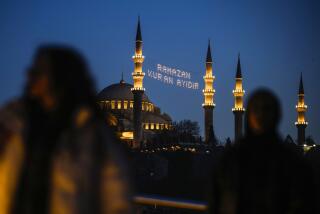Media : It’s News Vs. Nudes in the Turkish Press : The glitzy Sabah daily and the respected Cumhuriyet reflect clashing cultures at a continental crossroads.
- Share via
ISTANBUL, Turkey — One is glitzy, popular, upwardly mobile and if it were human would probably munch on an American hamburger. The other is older, wise and respected but racked by a midlife crisis that may yet drive it to ruin.
They are both Turkish newspapers: brash Sabah, circulation 700,000 and rising; and Cumhuriyet, the country’s oldest national quality daily, which is kept alive by little more than the support of its small (about 50,000 copies sold) but near-fanatical body of readers.
This is not just a battle between editors of the young, all-color, would-be “Turkey Today” and a newspaper founded in 1924 on the model of the New York Times. It is also a clash of cultures competing for the soul of this brawny country of 57 million people at the crossroads of Europe, the Middle East and Asia.
There is little doubt about who is winning.
“Sabah is a crazy mixture: some of the best writers, not much concern with quality, but now probably the most successful paper in Turkey,” said Haluk Sahin, a commentator for Cumhuriyet. “It’s a jumble: semi-European, semi-Oriental, semi-peasant, semi-urban and with more nudity per inch than anywhere else in the world.”
Sahin could have been sketching the state of Turkey’s big cities after a decade of breathtaking economic expansion, internal migration by traditional villagers and chaotic, get-rich-quick consumerism that has been the hallmark of the rule of President Turgut Ozal.
Even Sabah’s beautiful new headquarters of tinted glass and polished granite is a statement of Turkish contrasts. Equipped with cutting-edge technology, acres of space and a basement swimming pool, it is surrounded by the polluted slums, ragged development and sweatshop factories on an outer Istanbul ring road.
The newspaper walks a highly leveraged financial tightrope, forced to keep up its circulation with massive TV advertising and an extraordinary string of daily competitions that give away scores of cars a month.
“It is crazy, I know. . . . We are now trying to slow the competition down,” said Sabah’s publisher, Dinc Bilgin. “We are also constantly upgrading the newspaper in intellectual terms. But we are cautious. We want to remain Turkey’s biggest-selling daily.”
Bilgin, the grandson of Turkey’s first major newspaper proprietor, started Sabah seven years ago on a shoestring budget with sensationalist, apolitical stories and expanses of female flesh that surprise many a visitor to this Muslim country.
After the political violence that ended with the 1980-83 military takeover, Bilgin said, “Turkey became a different country, a liberal market. In Sabah, we caught these rising expectations.”
Now, as Turkey develops, Bilgin is trying to take Sabah up-market by hiring away the cream of the staff of Cumhuriyet and ending embarrassing mistakes like a front-page photograph of the defense minister with his “new” wife--soon discovered to be of 20 years’ standing.
With great fanfare, Sabah has hired Hasan Cemal, the long-term editor of Cumhuriyet who resigned in January after failing in an epic fight to bring his newspaper into the Turkish mainstream.
“I tried to widen the spectrum, to keep the balance. But they (old-guard intellectuals) always resisted, calling us plotters, tools of big business and the United States,” said Cemal, a onetime radical leftist himself who looked slightly uneasy at the squeaky-clean offices of Sabah, where not only cigarettes but even flowers are banned.
It could not be more different from the grimy offices of Cumhuriyet (pronounced Jum-hur-i-yet), only recently computerized and still located in the area called the “Sublime Porte,” the heart of old Istanbul named after the nearby chancelleries of the former Ottoman grand viziers.
The newspaper is physically entwined in the history of Turkey’s Westernization: Its first home was an old wooden mansion, now decaying and abandoned in the front yard, that was the World War I-era headquarters of the reformist “Young Turk” Committee of Union and Progress.
Cumhuriyet (The Republic) has since 1924 usually been the mouthpiece of the committee’s successor, the modernizing reformer Kemal Ataturk, who built Turkey up from the ruins of the Ottoman Empire.
Ataturk’s doctrines became known as Kemalism, the republic’s state ideology of rigid opposition to Islamic fundamentalism, neutrality to the point of isolationism and a society and economy strictly guided by the state.
But the cult of Ataturk has wilted under the onslaught of a second revolution of “Ozalism,” named after the current Turkish president’s program favoring consumption, free markets and an opening up to the outside world. Cumhuriyet tried to move with the times, first under Cemal and then under his successor, Okay Gonensin, but it ran up against implacable opposition from the Kemalist old guard at the newspaper.
The crisis between old and new came to the boil last November. The Kemalist faction demanded that the economics editor’s writing be curtailed after he dared to suggest the country would benefit from a right-wing coalition government. Failing to gain satisfaction, the old guard led a walkout by nearly 40 top journalists and commentators.
Already hit by a collapse in advertising revenue during the Gulf War, Cumhuriyet barely survived the blow. Circulation fell by half, and it was saved only by an extraordinary campaign by readers to buy extra copies and even pay money into a special account.
“We need a voice to stand for the principles of Kemal Ataturk and against the get-rich-quick immorality of 1980s Turkey,” said one letter.
On April 8, backed by a consortium of little-known financiers, the old guard staged a boardroom coup and regained control of the newspaper. The photograph of the new editor, Ilhan Selcuk, soon loomed large on the front page.
“The most striking thing about Mustafa Kemal (Ataturk) was his independence,” Selcuk wrote in his first editorial. “Look how many (Turks) have set their watches by Washington time. We must not surrender our minds to Western domination.”
Saving the country has been the rallying cry of all of Turkey’s three military coups since 1960. And as in all coups, blood flowed at the Cumhuriyet one, even if only metaphorically. Managing Director Emine Usakligil resigned, as did Gonensin and his aides. The Ankara bureau chief was fired.
Nobody doubts the sincerity of the aging Kemalists now back in charge, many of whom suffered years in military prisons for their left-of-center beliefs. The new management says circulation has started to climb again.
But columnist Sahin, also general secretary of Turkey’s Press Council, said the newspaper risks becoming a marginal player.
“The (radical Kemalist) ideology has withered away. Is has become less appealing to younger people,” he said.
“There has been a great cultural erosion. Cumhuriyet was a very dominant paper when the mission of saving Turkey was on the shoulders of the intellectuals. But that burden has been transferred to Turkish businessmen. A business culture has become the dominant culture in Turkey.”
More to Read
Sign up for Essential California
The most important California stories and recommendations in your inbox every morning.
You may occasionally receive promotional content from the Los Angeles Times.










